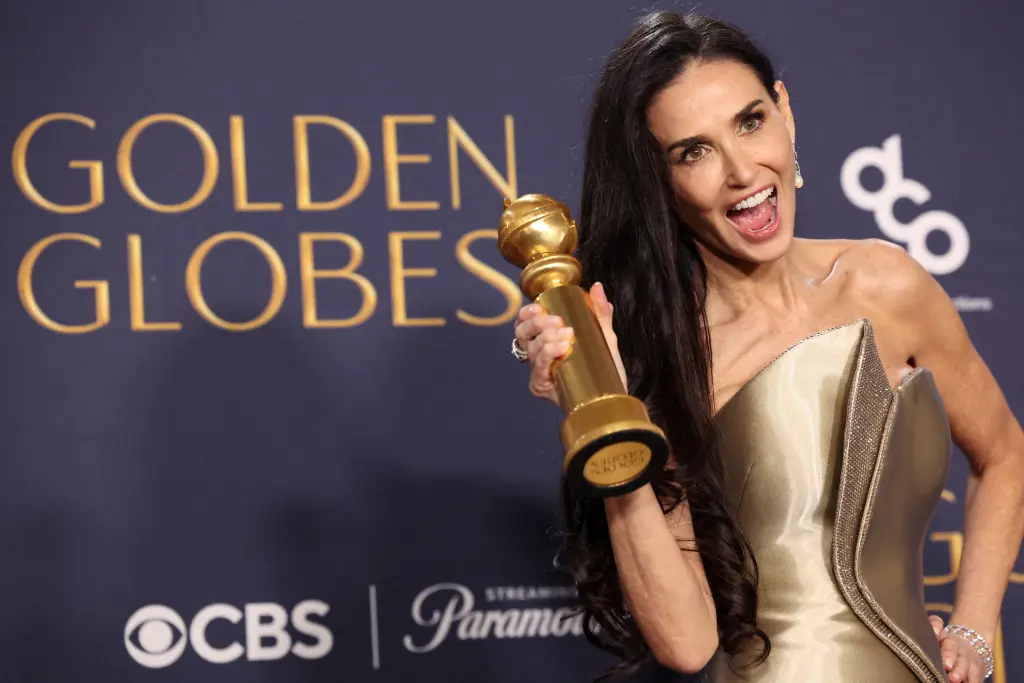Demi Moore: A Golden Triumph and the Grit Behind the Glamour

When Demi Moore took the stage at the 2025 Golden Globe Awards to accept her very first award for Best Actress in a Motion Picture – Musical or Comedy, the applause felt like a collective exhale from Hollywood and her fans alike. Clutching the gilded trophy, Moore’s voice wavered as she addressed the crowd, delivering a speech that cut through the artifice of showbiz and landed squarely in the realm of raw, unfiltered honesty.
“There was a time,” she began, “not that long ago, when I thought my days in front of the camera were over.”
It’s no secret that Moore’s career has been a rollercoaster, a stark reflection of the often-brutal realities of show business. Rising to fame in the 1980s and 1990s with iconic performances in Ghost and A Few Good Men, Moore became a box-office darling. But Hollywood is notoriously unkind to actresses as they age, and Moore’s career began to wane in the 2000s. The star’s personal struggles — a highly publicized divorce, health issues, and the ever-present scrutiny of a patriarchal industry — added layers of complexity to an already challenging profession.
The Price of Perfection
“The industry thrives on reinvention,” Moore said in her speech. “But it also thrives on impossible expectations.” Show business has always been a double-edged sword: it rewards youth, beauty, and relevance, while punishing vulnerability. For Moore, maintaining a career meant walking a tightrope of constant self-reinvention, often at great personal cost.
In a candid interview leading up to the Golden Globes, Moore revealed that she had considered leaving acting altogether. “It felt like the world had moved on, and I wasn’t sure if there was a place for me anymore,” she admitted. “But then I realized, maybe it’s not about fitting in. Maybe it’s about creating a space that’s undeniably yours.”
A Comeback for the Ages
Her award-winning role in The Substance epitomized that ethos. Playing Elisabeth Sparkle, an aging actress grappling with her fading stardom, Moore brought a vulnerability and depth to the role that felt less like acting and more like catharsis. Critics hailed her performance as a career-best, and audiences resonated with the film’s unflinching exploration of fame, identity, and the pressures to stay relevant.
“This award is not just for me,” Moore said through tears at the ceremony. “It’s for anyone who’s ever been told they’re too old, too broken, or too much. It’s proof that it’s never too late to dream again.”
Showbiz: A Reality Check
Moore’s triumph is not just a personal victory but a poignant commentary on the industry at large. Hollywood’s obsession with youth and reinvention often leaves little room for growth and evolution. Actresses, in particular, are subject to an expiration date that’s as arbitrary as it is cruel. Moore’s win is a reminder that talent and authenticity can transcend the narrow confines of Hollywood’s expectations.
But the win also raises a larger question: why should actresses have to claw their way back into relevance after decades of proven talent? Moore’s journey, while inspiring, underscores the need for systemic change in an industry that often sidelines women once they’re past a certain age.
A Legacy Rewritten
For Demi Moore, this Golden Globe is more than just a trophy; it’s a hard-won affirmation of her resilience and artistry. As she left the stage, clutching her award and basking in a standing ovation, one thing was clear: Moore’s story is far from over. If anything, it’s a new beginning.
“I’ve learned that it’s not about what others think you should be,” Moore concluded. “It’s about being exactly who you are, unapologetically. And if that means rewriting the rules, then so be it.”
Hollywood, take note.








